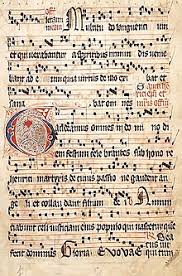I had no idea that recently-deceased Archbishop Rembert Weakland was almost single-handedly responsible for the abolition of Gregorian chant in the Benedictine Order, which had been praising God with the ancient song from time immemorial. As John Byron Kuhner recounts, Abbot Weakland, then primate of the Order, confronted Paul VI, refusing to submit to his 1966 Sacrificium Laudis, decreeing that the Benedictines, and every other monastic community, continue using the Latin chants. According to the story – to which there may be another side – when faced with Rembert’s intransigence, Pope Paul capitulated. The Pope would later abrogate the chant from the Mass as well, using the very limited authority of two weekly audiences in 1969, soon after the Second Vatican Council. (See here and here).
Here is Pope Paul’s odd and disconcerting paragraph from the second of these audiences, three years after his fateful meeting with Weakland, just as the Novus Ordo was being mandated across the sometime-Latin rite:
It is here that the greatest newness is going to be noticed, the newness of language. No longer Latin, but the spoken language will be the principal language of the Mass. The introduction of the vernacular will certainly be a great sacrifice for those who know the beauty, the power and the expressive sacrality of Latin. We are parting with the speech of the Christian centuries; we are becoming like profane intruders in the literary preserve of sacred utterance. We will lose a great part of that stupendous and incomparable artistic and spiritual thing, the Gregorian chant. (Par. 8)
What was put in place, as Weakland himself ironically admits, was a medley of ever-more treacly and banal ballads, which got worse over time, with which many readers grew up, and which likely helped drive many people out of their churches, or at least out of modern liturgies, and into the TLM, the Ordinariate or the Eastern rites, to say nothing of those who have jumped ship to some form of Eastern Orthodoxy.
It does not seem that any Pope has the authority to abrogate the ancient and traditional chant, attributed for its formalization to Pope Gregory the Great (+604), but which predates him by centuries, and which will be sung and prayed unto the end of time, and then some.
The sensus fidelium has spoken, for the chant continues across the world. And, on that note, if you will pardon the pun, for our musical offering this week, here is a selection of chants from the monks at Clervaux in France. Qui cantat bene, ora bis.


